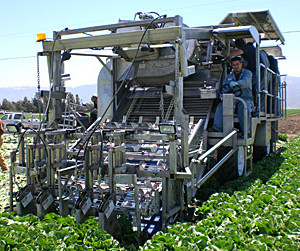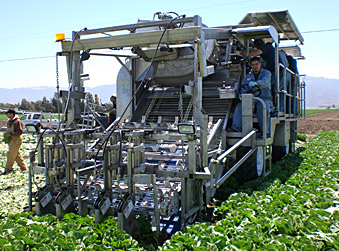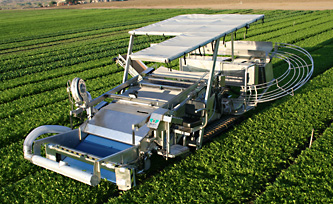Mark Krikorian at NRO’s The Corner has a pretty fascinating piece on immigration. I’m not sure he’s fully thought through what he’s saying, but he’s almost certainly correct:
The United Farm Workers has launched a tongue-in-cheek lobbying campaign (to be highlighted tomorrow on Colbert’s show) called “Take Our Jobs.” In the words of the AP story, the effort encourages “the unemployed — and any Washington pundits who want to join them — to apply for [some of the] thousands of agricultural jobs being posted with state agencies as harvest season begins”; there’s an online form under the heading “I want to be a farm worker.” The message is that America can’t function without an endless supply of peasant labor from abroad, the goal being to make the case for the AgJobs bill, which would amnesty illegal-alien farm workers and set up an open-ended indentured-labor program to import more. (This is one of the two main piecemeal amnesties that are apparently now on the agenda of the Democrats and their fellow-travelers on the right.)
Clever, and props to the marketing firm that came up with it. But since the effort was initiated by a labor union, it is, inevitably, economically illiterate. The fact is that no one wants to be a farm worker, not even farm workers, precisely because we have so many foreign farm workers. In other words, the low pay and appalling working conditions in farm labor are a direct result of excessive illegal immigration and agricultural guest-worker programs, which keep the labor market looser than it would otherwise be and reduce incentives for change. With fewer field hands available, farmers would do two things: First, raise wages and improve working conditions (because given the right circumstances, there are a non-trivial number of Americans and legal immigrants willing to do farm work). Second, they’d accelerate efforts at finding ways of getting by with less labor; i.e., mechanize.
Contrary to the assumption behind this amnesty effort, reducing the amount of foreign farm labor through better enforcement and ending guest-worker programs would not mean all those jobs would have to be filled by Andy Anglo and Wendy Whitebread. Rather, the foreign farm workers would be replaced by the likes of this:
and this:
(These are from Ramsey Highlander; there are other manufacturers as well.)
Sure, they still require labor, but the workers would be fewer, and more productive, and thus better paid, turning what is now a primitive, atavistic work environment featuring exploitation and injury into something a little more civilized. No one dreams of a career collecting trash, either, but with high pay and automatic can-dumpers, there are plenty of (native-born) takers.
All sides of the debate seem to agree with the obvious fact that even unemployed Americans tend to refuse to do farm labor. It’s hard to blame them. Farm labor (at least, for smaller farms) is the only part of the economy that isn’t bound by minimum wage laws, overtime laws, child labor laws, or Sabbath laws. This means that, particularly during the harvest, you work back-breaking work twelve to fourteen hours a day, seven days a week, for about half of what those of us in the nonfarm private sector make. Or, if you’re an unemployed American citizen, you can choose to collect unemployment instead.
Now, Krikorian’s argument is basically as follows:
- Wages for US farm work are low now because of illegal immigration.
- Kicking out illegal immigration will make it harder for farmers to hire cheap workers.
- This will force them to either (a) increase wages and benefits to attract domestic workers, and/or (b) replace humans with robots.
For major agribusinesses, there’s a third option which Krikorian ignores: exporting the entire farm to Mexico (or somewhere else). Under that scenario (which he doesn’t address), American workers obviously lose out big time. And while labor conditions are dismal for illegal farm-workers in the US, they’d almost certainly be worse in Mexico. All it takes to lead to this exodus is for the price of labor in the US to get so high that it’s cheaper for the company to just move. That process has begun already in places where the government is cracking down on illegal immigration. Krikorian’s analysis is flawed, because he’s comparing the demands of American workers, with the demands of immigrant workers in the US, and saying (essentially), “If only those immigrants weren’t there, American workers would be getting all of their demands.” In a globalized market, that’s naive. If those immigrants weren’t there, the jobs wouldn’t be, either. And that, of course, is what would actually take American jobs, and export them.
But set that point to one side, because there’s something even more glaring. Krikorian is actually arguing for replacing human labor with robots. He claims that, “Sure, they still require labor, but the workers would be fewer, and more productive, and thus better paid, turning what is now a primitive, atavistic work environment featuring exploitation and injury into something a little more civilized.” This point seems almost willfully ignorant of how supply and demand works.
Economics 101: labor markets work like every other market, controlled by supply and demand. If you’re competing for a job against an equally-qualified guy willing to work for a dollar an hour less, he’s going to get it — to be competitive, you’ll have to settle for less than you’d like to. On the other hand, if two companies are both trying to hire you, you’re in a good position to demand higher wages.
Now, Krikorian seemingly gets this. After all, he just finished arguing that eliminating illegal immigrants from the job pool would increase wages and benefits by decreasing available labor — in other words, there’s the same demand for labor, but less supply. But mechanization does the exact opposite. It radically decreases the number of workers needed — so demand for workers plummets. Instead of a hundred people applying for fifty jobs, it’s a hundred people applying for ten jobs (or fewer). And whatever he may say, that doesn’t lead to better pay: it leads to worse pay, and obviously so.
Let’s assume, for the sake of argument, that one person operating a basic machine can do the job that fifty people normally do. I’m not sure what the actual ratio, but it’s likely at least at that point (and if it isn’t, it will be, soon enough). Now envision a farm with 100 people working on it.
Statistically, about half of them or so are likely illegal immigrants. So let’s assume that through some incredible enforcement scheme, we’re able to round up and deport all of these 50.
The owner then buys one of the giant farming machines which Krikorian depicts. Now, instead of 100 people filling 100 jobs, he’s got 50 remaining workers, but only needs 2 or 3 of them (two to run the machines, and maybe someone as backup). Since driving the machine is pretty basic, he’s likely to just keep the workers willing to take the shapest cut in pay — in this case, this almost certainly means a couple of the legal immigrants. The illegal immigrants have been deported, the native-born Americans have been fired, and the few legal immigrants able to hold on to their jobs are probably going to face a cut in pay, not a promotion. Literally, everyone besides the owner is worse off.*
Once this economic shift occurs, the damage is permanently. Well before the current economic downturn, Marshall Brain, founder of HowStuffWorks.com, had this to say in the aftermath of the last economic slowdown:
There is no mystery — the jobless recovery is exactly what you would expect in a robotic nation. When automation and robots eliminate jobs, they are gone for good. The economy then has to invent new jobs. But it is much harder to do that now because robots can quickly fill the new jobs that get invented.
So once those American workers lose their farm jobs, either to workers in third-world countries, or more likely, to robots, those jobs are gone forever. This means higher unemployment in both the US and immigrants’ home countries, lower wages, and greater strain on the safety nets both in the US and in home countries.
What’s weirdest about all of this is that conservatives know this. You can’t magically make more money by increasing labor costs. These two factors — job exportation and mechanization — happen every time the Left increases the minimum wage.
I want to be clear. The wages paid to farm workers are a sin. As James 5:4 says, “Behold, the pay of the laborers who mowed your fields, and which has been withheld by you, cries out against you; and the outcry of those who did the harvesting has reached the ears of the Lord of Sabaoth.” But the solution to that isn’t to deport the worker, or replace the worker with a machine. It’s for farmers to increase workers’ wages as much as possible while still making ends meet, and still producing a marketable good.
*Actually, in the short term at least, the owner is also worse off. Employing 100 people at current insanely low wages is cheaper than buying massive farming equipment. If that weren’t the case, we’d already have seen this mechanization. So literally, everyone loses.



Great post, Joe.
There are a few otehr issues that weren’t touched, perhaps because they mechanization argument doesn’t work well if they had.
First and most important: not all crops can be mechanized. Grapes and olives, for example. They are and will always be labor intensive.
Second, The harvest itself is only part of the process. Quality control can only be done (up until now) by humans, touching, smelling (yes, really, I’ve seen it done) and seeing the fruits or vegetables.
Third, there is a huge market for non-mechanized crops. Something like what the author proposes would increase demand and shift resources to that market. Japan, for instance, is the higher consumer of “boutique” crops in the world.
Fourth, you can only reap benefits from mechanization up to an extent. The land needs to rest, its nutrients get depleted. It’s not like it’s an ever-increasing efficiency curve. The reality is that for many crops, such as tomatoes, onions, and potatoes, farm lands are already mechanized to the extent that it is beneficial. Further mechanization would be a cost that you cannot recover through greater yields.
Anyway, my two cents, having had a lot of exposure to the agricultural industry during the first four years of my career. I’m sure what I said also has caveats and exceptions, but I think that the argument “let’s mechanize it all” it’s entirely too simplistic. You can’t even use a rake to harvest grapes, little less a machine. You wouldn’t want to eat those grapes.
Let us not neglect to consider that once the machinery is paid off, the consumers will be better off because prices can be lower.
Especially the poor.
That is always a burning issue with food: wages vs. food prices.
Actually, prices of crops are very rarely set by the farmer himself. For the most part, crop prices are set at different commodities exchanges around the world (like the ones in Kansas City and Chicago) so paying off machinery would not necessarily imply lower prices, actually, I don’t think it would mean that at all. Prices will continue to be determined by supply and demand. You can argue that automation increases supply, and I would agree with that, but because of what I said before (land is already stretched very thin) I don’t think more automation would have a material effect on supply.
Most of the time people think and talk about price and cost interchangeably, when in reality, there are very different things. Once the machinery is paid off, the farmer will face a lower cost (and that only using cash basis of accounting, not accrual. Cash basis is forbidden by the Accounting Standards, by the way). That, however, doesn’t mean that he will lower its selling price automatically, Why would he voluntarily reduce his profit margin? Nobody that’s running a business would do that, maybe a not-for-profit, but I don’t know of any that is a serious crop producer.
The cost of machinery can certainly put a farmer out of business if the price of crops fall so much that he can’t make payments, but I just don’t see a scenario where prices would decrease because of machinery in isolation. Machinery driven supply would have to increase dramatically for that to happen and I go back to my point that they can only make you more efficient to a certain extent, because the real limitation is the land and its ability to maintain and recover nutrients. Again, I don’t see machines as the panacea, because with the current state of automation, crops have to be rotated and land has to be left to rest for periods of time, so as to not deplete it. Forests are being cut down to turn them into farmland…
I think I’ve strayed too much from the issue of machines and illegal immigration, but I thnak you for the opportunity to exercise my gray matter 🙂
Great comments, both of you. Here’s my two cents:
1. On machines: Carlos, I think everything you said there was right. I was reading a bit on it in writing this post, but I was afraid it would veer off-course. The truth is that Krikorian’s vision of a world in which farm machines increase worker wages is flatly wrong for things like wheat (did machinization mean that the Industrial Revolution improved working conditions, over farm labor?), and just inapplicable for things like grapes (which, as you noted, don’t respond well to machines).
At least for now, anyways.
2. On the moral good of providing low cost goods to consumers: Mary, I agree with you that this is typically a real balancing act. This is true for certain agricultural decisions: for example, the US ships lots of food aid to third-world markets. It means people can eat, but it also potentially makes it hard for farmers to make a living, meaning they stay in poverty longer.
In this area, I don’t think the balancing act need apply. Those who need food in the US can get it, particularly with things like food stamps. We spend a smaller portion of GDP on food than anyone else. And switching to machines is unlikely to impact grocery-store prices very much, for the reasons Carlos said, but also because the initial costs of the machines are daunting.
If farmers could produce food cheaper (over the short, or even the long term) by switching to machines, they almost certainly would have already.
Of course, we’re bounded to act morally even in achieving the moral good of affordable foodstuffs. So if providing marketable food is possible only by violating the just wagers of the worker, it’s a no-go — no doing evil so good can come about. But switching to machines isn’t that sort of open-and-shut moral question, of course.
Joe.